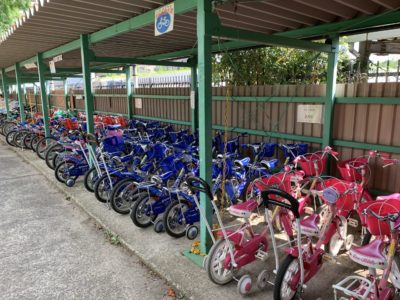You Tubeで話題の「ただよび」の英語。受験はもちろん、基本を見直したいという方にも見られているのではないでしょうか。わかりやすい説明で勉強になるのですが、パターンプラクティスをするには例文がまとまっていると便利だなと思い備忘録を兼ねてまとめています。
ただよび
完全無料で受けられるオンライン大学受験予備校として話題の「ただよび」。
ただよびの英語は、TOEIC満点80回以上の予備校講師「もりてつ」こと森田鉄也さんが教えられています。文法についてCD付きで学べる本も執筆されています。
ただよびやパターンプラクティスについては、以下に書いています。
文型
今回は第3〜10講で紹介された「文型」とそれに関する例文をまとめています。
第1文型:SV
第1文型は、主語(S)と動詞(V)だけを使う文型です。
第2文型:SVC
第2文型は、主語(S)、動詞(V)、補語(C)からなる文章です。補語(C)とは形容詞か名詞です。この形容詞や名詞は、「John became happy.(John=Happy)」や「John is a doctor.(John=doctor)」のように主語(S)と同じものを指します。
第3文型:SVO
第3文型は、主語(S)、動詞(V)、目的語(O)からなる文章です。第2文系とは異なり、動詞の後の名詞が主語と同じものを指しません。例えば、「We bought a car.(We≠car)」「I love you.(I≠you)」などの文が該当します。
第4文型:SVOO
動詞の後ろに主語(S)とイコールにならない目的語(O)が2つ続くのが第4文型です。2つの目的語の順番としては、「My mother bought me a watch.」のように人→ものとなります。
第5文型:SVOC
「He made me angry.」のように「目的語(O)me=補語(C)angry」の関係にある文型です。補語(C)には名詞か形容詞が入ります。
例文
第1文型
・He smiled at me.
・I live in Tokyo.
・I grew up in Japan.
・We went to Tokyo.
・The store opens at 9:00.
・Ken got to the station.
第2文系
S+V+C(名詞)
・John is a doctor.
・John is a tall boy.
・John became a doctor.
・John looks like a doctor.
・John looks like a professor.
・John looks like a student.
・John looks like a nice guy.
・John sounds like my father. (お父さんみたい)
・That sounds like a good idea.
・John appears to be a manager. (マネージャーのように見える)
・John appears to be a nice guy.
・John and Ken remained good friends.(仲の良い友達のままだった)
・John and Ken looked like good friends.
・John and Ken sounded like good friends.
・John and Ken became good friends.
S+V+C(形容詞)
・John is tall.
・John is smart.
・John looks smart.
・John looks happy.
・John looks sad.
・John looks crazy.
・John appears smart.
・John appears sad.
・John became happy.
・John sounds smart. (賢そう)
・John sounds happy.
・John sounds sad.
・John remained silent.
・John stayed silent.
・The milk smells strange.
・The milk tastes sour.
・The milk tastes good.
・Silk feels soft.
・My dream came true.
・The milk went sour.
・Something went wrong.
・John fell asleep.
・John got angry.
・The leaves turned yellow.
・Ken grew tall.
・The shop is open.
・The shop is closed.
第3文型
第3文型はたくさんありすぎるので覚えてもあまり意味がないとのことでしたが、分散していくつか例文が出てきていました。
・We bought a car.
・I love you.
・We cleaned the room.
・She kept her promise.
・I grow flowers.
・I grow vegetables.
・I speak English.
・I speak German.
・I speak Italian.
・Ken got some food.
・I bring up children.
第4文型
第4文型は特に重点的に講義されていましたね。
・I can offer you everything.
・I can give you everything.
・I’ll give you everything.
・I’ll lend you my pen.
・I’ll send you a letter
・I’ll teach you everything.
・I’ll get you some water.
・I’ll buy you everything.
・I’ll cook you something.
・I’ll make you something.
・I’ll find you a new house.
・John told Susan his secret.
・Ken got me some food.
・Ken showed me his album.
・Ken chose me a nice dress.
第4文型はS+V+O1+O2ですが、O1とO2を入れ替えることができます。そのとき難しいのが、動詞がXX 物 to 人とXX 物 for 人のどちらの形を取るかということです。その考え方として以下を紹介されていました。確かに!という感じですね。
XX 物 to 人:あなたに向かって直接できる(例:lendなら「あなたに直接貸す」というイメージ)
・I can lend everything to you.
・I can tell everything to you.
・I can send everything to you.
・I can give everything to you.
・I’ll offer everything to you.
・I’ll teach English to you.
・I said no to John.
・Please say hello to John.
・I’ll show the photo to you.
XX 物 for 人:何かをしてからそれをあげる(例:getなら「何かを取ってきてあなたに渡す」というイメージ)
・I can get everything for you.
・I’ll buy everything for you.
・I’ll cook something for you.
・I’ll make something for you.
・I’ll find it for you.
その他、aboutが必要な動詞や、itはO2に使えないことを例文にしたものは以下です。
・I’ll talk to you about the plan.
・I’ll speak to you about the plan.
・I’ll tell you about my dog.
・I’ll tell it to you. (× I’ll tell you it. )
・I’ll give it to you. (× I’ll give you it. )
第5文型
SVOCの第5文型ではO=CでCは名詞か形容詞になります。
O=C(名詞)
・Ken named his dog John.
・Ken calls his dog John.
O=C(形容詞) (Oが主語Cが述語になっている)
・Ken left the door closed.
・Ken found the door closed.
・Ken kept the door closed.
・Ken kept the door open. (× opened)
・I found the story true.
・The dog made us happy.
・Ken got food ready.
余談:第10講 場所を示す副詞・名詞
場所を示す単語が副詞の場合前置詞が不要で、名詞の場合は前置詞が必要です。
副詞の場合(前置詞不要)
・We arrived home early.
・We came home early.
・We got home early.
・We went home.
・We went there.
・We came here.
・We went abroad.
・We went overseas.
・We went upstairs.
・We went downstairs.
・We went underground.
名詞の場合(前置詞必要)
・We arrived at school early.
・We came to school early.
・We got to school early.
・We arrived in Tokyo.
・We arrived in Japan.





コメント